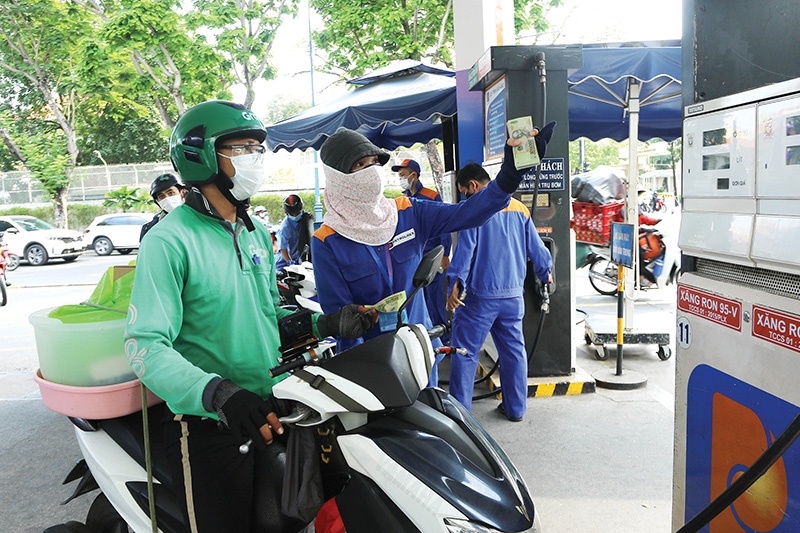Workers scramble to evade fuel hike
 |
| It has been harder for motorbike taxi drivers to get by in some of the big cities because of current petrol costs, Le Toan |
Since gasoline approached the threshold of VND30,000 ($1.30) per litre in Vietnam, travel expenses have become an obsession for people who often have to move between long distances to work, including Luong Mai Loan.
Loan is a worker at a leather goods factory based in Hanoi’s Ha Dong district, but her family lives in Thuong Tin district, about 18km away. Every day, she rides a motorbike to and from work for a distance of nearly 40km, with a weekly fuel cost of nearly VND100,000 ($4.35).
The rising petrol prices mean travel costs 1.5 times more, making Loan even more worried.
“The business I work at is in financial difficulties so we have only received our full salary for three months, but the prices of consumer goods have also increased at the same time. With my low monthly income, I feel a lot of pressure when I have to find a way to take care of the whole family,” Loan said.
The worry over petrol price increases is not only a concern of those who often have to travel as far as Loan, but it also creeps into the minds of many households as they calculate their spending properly so as not to run out of cash before the next payday.
“The rate of price increases for current items is several times faster than wages, so going to work is just enough to make ends meet,” said Chi Nguyen, a waitress at a restaurant on Hanoi’s Chua Lang street.
Chi’s family has cut the amount of meat they buy, while snacks and fruits were also cut from their shopping list. “Only for basic expenses, I have to spend up to VND500,000 ($22) more each week,” she added.
The tight spending situation of customers also makes small businesses become unwilling victims. According to some small traders, many products and essential consumer goods have had to apply new prices on items such as cooking oil, milk, fruit, instant noodles, and beer.
Vu Mai Phuong, a grocery store owner in Minh Khai street in Hanoi, said, “The agent has just announced that the price of the next batch of goods will increase even more because input materials and transportation costs have both gone up.”
In order to stimulate the consumer demand and create momentum for the economic recovery, the government decided to adjust the VAT rate for some groups of essential goods from 10 to 8 per cent from February 1. However, the sudden increase in gasoline prices since then has led to an increase in the prices of items from a few per cent to more than 10 per cent.
According to data on GDP per capita of Southeast Asian countries, Vietnamese people earn about $10.25 per day, while the price of gasoline in Vietnam is about $1.3 per litre. The rate is much higher than other countries in the region such as Thailand, Indonesia, and especially Malaysia.
Along with the escalation of the price level, another obvious consequence is the difficulty of booking a car or ordering a shipper from ride-hailing or food apps. Many drivers of Grab, Gojek, and Be Group have written online that the price of gasoline has increased too quickly while the freight rate has remained the same, making many drivers frustrated and not wanting to turn on the app to receive orders. This has caused a shortage of shippers and drivers in recent days.
Grab bike driver Tung Pham explained driver incomes are now sharply reduced because all companies are applying a high discount policy to customers. Booking fares also only apply to the customer’s booking point, while in some cases the driver has to travel quite far to reach the pick-up point. Therefore, profit is only attainable when bookings are made in peak hours when the fares are higher. “Because of this, many drivers have chosen to turn off the app and find a temporary job while waiting for petrol prices to be more stable before returning to work,” said Pham.
Grab was the first tech car company to announce an increase in fees for all services to support drivers. The price of the first 2km in a 4-seat GrabCar service in Hanoi and Ho Chi Minh City has increased by VND2,000 (9 US cents) and each subsequent kilometre has increased by VND500 (2 US cents). Gojek soon followed with similar hikes.
Meanwhile, Be Group said that it will not increase the price of all products and services, but will suffer reduced profits of about 10 per cent in order to share difficulties with BeCar drivers during the economic recovery period.
Although tech car companies have confirmed that they will calculate how to bring the best services to users while at the same time encouraging drivers to actively work, the price increase does not significantly improve the driver’s real income.
GrabCar driver Nguyen Long said that the pressure on 4-seater cars is even greater, with the VAT reduction rate decreasing according to the level of the state, but not truly affecting the real nature of the app.
Faced with the stressful situation of gasoline prices, Long said that many drivers want the company to reduce the discount for 4-wheel vehicles to 20 per cent, thereby improving the driver’s income and not avoiding fare rises that turn off customers.
| Cuong Nguyen - Founder C-Brewmaster
C-Brewmaster stores in Hanoi and Ho Chi Minh City have just resumed operations after a few months of closure, but recently we continue to face new challenges from the consequences of increased gasoline prices. Our factories are located far from the centre, so the cost of transporting products to stores and agents is also a big pressure. Currently, the company is facing a shipping fee that has increased by about 15-20 per cent compared to a few months ago. Input prices of raw materials also increased by 15-30 per cent. Our business activities were also affected a lot after Decree No.100/2019/ND-CP enacted in late 2019 on penalties for road traffic offences and two years of COVID-19. Now, we still try to hold out to ensure a stable price for customers. However, the company is also considering adjusting the selling price of some products to partially offset the production costs, but the price increase will be made on a gradual schedule and must be considered based on the movements in gasoline prices, transportation charges and the increase in prices of raw materials in the coming time. Bui Trung Chinh - Food purchasing director AEON Vietnam
Recently, we have received price increase proposals from some suppliers due to the rapid rise in gas prices. For essential items such as fresh and dry food, about 5 per cent of suppliers suggested increasing prices at an average of 5-10 per cent. We are still trying our best to negotiate with suppliers to offer the best prices for consumers, and at the same time accept to reduce profit margins to accompany customers. Particularly for fresh and frozen products, proposals on price increases mostly come from imported items due to the impact of the worldwide labour shortage as well as high ocean and air freight rates that affect the price of goods and services in the long term. AEON Vietnam is continuing our search for more quality domestic products at reasonable prices that can replace these items. The increase in petrol prices also changes consumers’ spending habits. They will focus on essential items and reduce spending on all non-essential products and services. AEON Vietnam and suppliers are collaborating to bring many attractive preferential programmes and price subsidies to offer customers a variety of choices when shopping. |
What the stars mean:
★ Poor ★ ★ Promising ★★★ Good ★★★★ Very good ★★★★★ Exceptional
 Tag:
Tag:
Related Contents
Latest News
More News
- Congratulations from VFF Central Committee's int’l partners to 14th National Party Congress (January 25, 2026 | 09:46)
- List of newly-elected members of 14th Political Bureau announced (January 23, 2026 | 16:27)
- 14th Party Central Committee unanimously elects To Lam as General Secretary (January 23, 2026 | 16:22)
- List of members of 14th Party Central Committee announced (January 23, 2026 | 09:12)
- Highlights of fourth working day of 14th National Party Congress (January 23, 2026 | 09:06)
- Press provides timely, accurate coverage of 14th National Party Congress (January 22, 2026 | 09:49)
- Press release on second working day of 14th National Party Congress (January 22, 2026 | 09:19)
- Minister sets out key directions to promote intrinsic strength of Vietnamese culture (January 22, 2026 | 09:16)
- 14th National Party Congress: Renewed momentum for OVs to contribute to homeland (January 21, 2026 | 09:49)
- Party Congress building momentum for a new era of national growth (January 20, 2026 | 15:00)
























 Mobile Version
Mobile Version